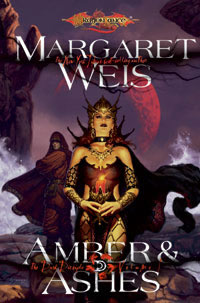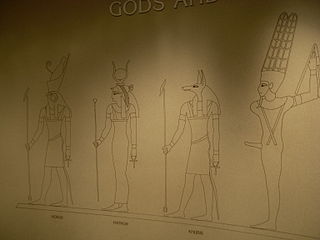
A goddess is a female deity. In many known cultures, goddesses are often linked with literal or metaphorical pregnancy or imagined feminine roles associated with how women and girls are perceived or expected to behave. This includes themes of spinning, weaving, beauty, love, sexuality, motherhood, domesticity, creativity, and fertility. Many major goddesses are also associated with magic, war, strategy, hunting, farming, wisdom, fate, earth, sky, power, laws, justice, and more. Some themes, such as discord or disease, which are considered negative within their cultural contexts also are found associated with some goddesses. There are as many differently described and understood goddesses as there are male, shapeshifting, or neuter gods.

Mut, also known as Maut and Mout, was a mother goddess worshipped in ancient Egypt and the Kingdom of Kush in present-day North Sudan. In Meroitic, her name was pronounced mata): 𐦨𐦴. Her name means mother in the ancient Egyptian language. Mut had many different aspects and attributes that changed and evolved greatly over the thousands of years of ancient Egyptian culture.

Mystra is a fictional goddess in the Forgotten Realms campaign setting for the Dungeons & Dragons fantasy role-playing game.
Georgian mythology refers to the mythology of pre-Christian Georgians, an indigenous Caucasian ethnic group native to Georgia and the South Caucasus.The mythology of the Kartvelian peoples is believed by many scholars to have formed part of the religions of the kingdoms of Diauehi, Colchis and Iberia.

Trudi Canavan is an Australian writer of fantasy novels, best known for her best-selling fantasy trilogies The Black Magician and Age of the Five. While establishing her writing career she worked as a graphic designer. She completed her third trilogy, The Traitor Spy trilogy, in August 2012 with The Traitor Queen. Subsequently, Canavan has written a series called Millennium's Rule, with a completely new setting consisting of multiple worlds which characters can cross between. Though originally planned as a trilogy, a fourth and final book in the Millennium's Rule series was published.

Arcanis was originally a campaign setting for the Dungeons & Dragons game, created by Henry Lopez and supported by Paradigm Concepts. It is also the name of the fictional world where the setting takes place. The setting was launched in 2001 and is known for its odd twists on the fantasy genre, as well as its wide member approval and community-based design and construction. Unlike many other fantasy roleplaying games, which focus primarily on tactical combat, the Arcanis campaigns focus on moral ambiguity and politics.

The Olympians are a fictional species appearing in American comic books published by Marvel Comics. These characters are based on the Twelve Olympians/Dii Consentes and other deities of Classical mythology. During the beginning of the 1960s, the exploits of the Asgardians Thor and his evil brother Loki demonstrated that an updating of ancient myths could again win readers. In 1965, Stan Lee and Jack Kirby introduced the Olympians in Journey into Mystery Annual #1.

Hittite mythology and Hittite religion were the religious beliefs and practices of the Hittites, who created an empire centered in what is now Turkey from c. 1600–1180 BC.

Amber and Ashes is a fiction, fantasy novel in the Dragonlance book series and is the first of a trilogy called "The Dark Disciple", based around the character Mina. The book takes up where the War of Souls left off. This trilogy will explore the Chaos that is post-war Krynn. It is authored by Margaret Weis, who was a co-founder of the Dragonlance series, along with Tracy Hickman. This is Weis's fourteenth novel in the series, and first solo hardcover since the publication of the extremely popular Dragonlance title The Soulforge in 1998.
The traditional Berber religion is the ancient and native set of beliefs and deities adhered to by the Berbers of North Africa. Many ancient Amazigh beliefs were developed locally, whereas others were influenced over time through contact with others like ancient Egyptian religion, or borrowed during antiquity from the Punic religion, Judaism, Iberian mythology, and the Hellenistic religion. The most recent influence came from Islam and religion in pre-Islamic Arabia during the medieval period. Some of the ancient Amazigh beliefs still exist today subtly within the Amazigh popular culture and tradition. Syncretic influences from the traditional Amazigh religion can also be found in certain other faiths.
The Olympian Gods are characters based upon Classical mythology who appear primarily in Wonder Woman, Captain Marvel and Aquaman comics.

Wiccan views of divinity are generally theistic, and revolve around a Goddess and a Horned God, thereby being generally dualistic. In traditional Wicca, as expressed in the writings of Gerald Gardner and Doreen Valiente, the emphasis is on the theme of divine gender polarity, and the God and Goddess are regarded as equal and opposite divine cosmic forces. In some newer forms of Wicca, such as feminist or Dianic Wicca, the Goddess is given primacy or even exclusivity. In some forms of traditional witchcraft that share a similar duotheistic theology, the Horned God is given precedence over the Goddess.

Polytheism is the belief in multiple deities, which are usually assembled into a pantheon of gods and goddesses, along with their own religious sects and rituals. Polytheism is a type of theism. Within theism, it contrasts with monotheism, the belief in a singular God who is, in most cases, transcendent. In religions that accept polytheism, the different gods and goddesses may be representations of forces of nature or ancestral principles; they can be viewed either as autonomous or as aspects or emanations of a creator deity or transcendental absolute principle, which manifests immanently in nature. Polytheists do not always worship all the gods equally; they can be henotheists, specializing in the worship of one particular deity, or kathenotheists, worshiping different deities at different times.
The Twilight Reign is a five-book series written by Tom Lloyd. The five books in order are: The Stormcaller, The Twilight Herald, The Grave Thief, The Ragged Man, and The Dusk Watchman It follows the fight against the shadow Azaer.

Chinese traditional religion is polytheistic; many deities are worshipped in a pantheistic view where divinity is inherent in the world. The gods are energies or principles revealing, imitating, and propagating the way of heaven, which is the supreme godhead manifesting in the northern culmen of the starry vault of the skies and its order. Many gods are ancestors or men who became deities for their heavenly achievements. Most gods are also identified with stars and constellations. Ancestors are regarded as the equivalent of Heaven within human society, and therefore, as the means of connecting back to Heaven, which is the "utmost ancestral father".
The Craft Sequence is a series of urban fantasy novels by American author Max Gladstone. It currently consists of six novels, beginning with Three Parts Dead (2012). The sequence received critical acclaim. It was nominated for the 2017 Hugo Award for Best Series.













